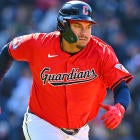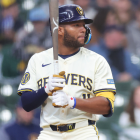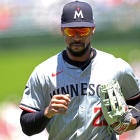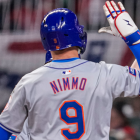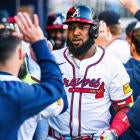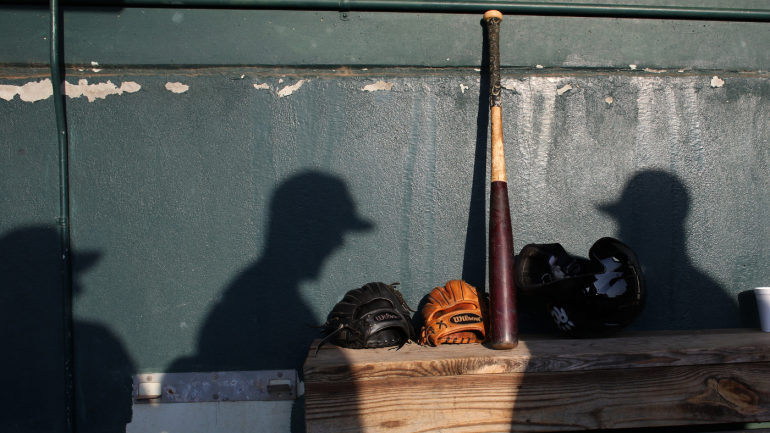
The date is March 12, 2020. A virus is silently spreading across the country and the sports world has been thrown into chaos after Utah Jazz forward Rudy Gobert tests positive for COVID-19, leading the NBA to shut down operations and suspend its season. In Arizona and Florida at MLB spring training, both minor- and major-league players don't know what's next.
"I was in the dugout for one of the Cactus League games and heard some of the veteran players, like (Mike) Trout and some of the older guys were like, 'This COVID stuff is getting really bad. There are whispers of us shutting down and us going home.' And you hear that, but your mind can't really comprehend what's going on," said an infielder in the Los Angeles Angels organization, who opted to remain anonymous for this story.
Less than 48 hours later, MLB teams informed players and personnel they were being sent home due to coronavirus concerns. Generally, minor leaguers report to Spring Training later than big leaguers. Some didn't even fully unpack their bags before they were sent home again.
Los Angeles Dodgers minor-league outfielder Andrew Shaps said every minor leaguer within the organization piled into the locker room and waited about an hour for an emergency meeting. "The meeting was like two minutes long, and they just sent us all home."
While there was a 60-game MLB season in 2020 and teams could also have prospects at alternate sites, the minor-league baseball season was canceled, and most minor leaguers did not get a chance to play in organized games. Fast forward 10 months later and those same players don't know what to expect with another COVID-compromised spring training looming.
Here's a look at what life was like for some minor-league players in 2020, and what it could look like if and when there is a minor-league season in 2021. That season will feature a revamped MiLB system with 40 less organized teams and hundreds fewer roster spots.
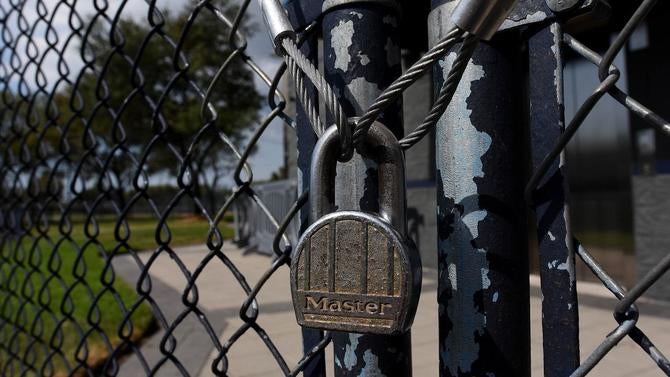
Pay stipends and (un)employment
Minor leaguers are not paid during spring training, which means they did not receive a paycheck from their employers since the end of the 2019 season when they were abruptly dismissed from spring camps due to the virus in March.
Just before the calendar turned to April, MLB announced its minor-league players would receive a $400-per-week stipend. However, the stipend was only promised "through at least May 31," meaning it would be up to each individual club to decide whether or not to pay the 200-250 non 40-man roster players under contract for the rest of the season. As our CBS Sports baseball writer Mike Axisa calculated, the total cost for club owners to pay 250 minor leaguers through August is roughly $2.3 million.
The Oakland Athletics initially decided not to pay their minor leaguers after May 31. Forbes estimates they took in $225 million in revenue in 2019 with a $96 million major-league payroll. Athletics majority owner John Fisher, who has an estimated net worth of $2.9 billion, soon admitted he "made a mistake" and wound up paying his players through August.
But players in many organizations were kept in the dark about what money might be coming their way. When asked what the communication was like between ownership and minor-league players throughout the process, one MLB executive said: "To be honest with you, owners live on a different planet. They're just not relatable. These guys just don't live in our universe. I think our owner is a pretty down-to-earth guy. But one thing I've learned is billionaires are gonna do whatever they want, and if we canceled the [MLB] season, I don't think the owners would have cared."
Meanwhile, the Angels waited months to inform their players whether they would receive stipends for that pay period. Several Angels players told Advocates for Minor Leaguers, a non-profit advocacy group working to provide a voice for minor league baseball players and improve working conditions, that they "didn't see a dime" certain months and have charged their organization for failing to pay.
"It was team after team after team saying they were gonna pay, and the Angels were just silent for the most part," an Angels minor leaguer told CBS Sports. "And then, basically because everybody else did, they announced they [would keep paying minor leaguers]. I'm glad they were able to give us that stipend, and I know a lot of my teammates could really use that. I mean, some guys have families. Some guys are in other countries where baseball is their sole source of income."
All 30 MLB clubs eventually announced they would pay their minor leaguers through the rest of the would-have-been 2020 season. Minor-league players were encouraged to join the nearly 23.2 million Americans in applying for unemployment. The problem, however, was not every minor-league player qualified.
Cardinals minor-league right-hander Eric Lex began working as a commercial banking analyst, doing pitching lessons on the side, and living with his parents to make ends meet. Before landing a full-time banking gig, however, Lex said he was denied unemployment despite being jobless.
"They denied me my claim, but then plenty of other players did qualify for unemployment. And the reason I didn't qualify is because I didn't make enough money in 2019," Lex said.
Lex spent the first half of 2019 as a pitcher for Santa Clara Broncos University while getting his degree. He then became a 27th-round draft pick of the Cardinals and pitched for the Class A State College Spikes, where players make a minimum of $290 a week (roughly $5,800 salary).
DIY home throwing net pic.twitter.com/GuweEtH6js
— Eric Lex (@swagmastermilly) April 8, 2020
Shaps, meanwhile, moved back home and began working for InstaCart, an independent contracting grocery delivery and pick-up service.
"If you want my honest truth, my expectations are so low that there was not one thing that surprised me because I didn't expect them to pay me when I wasn't playing," Shaps said. "I know how the industry works. I will say, although it was frustrating to wait and get answers, the Dodgers always did the right thing. There was never a move they made where I was like, 'What the hell?'"
Not every professional baseball player got a stipend. There were 1,000-plus players who were released from their clubs. With the exception of the Chicago White Sox, who provided weekly stipends for each of their released players through the end of June, players were not given any further compensation after being let go. According to ESPN's Jeff Passan, team officials claim "a vast majority of the players likely would have been released toward the end of spring training even if baseball hadn't been halted by the coronavirus pandemic."
Among those released was infielder Michael Perri, cut by the Cardinals in May. Perri was disappointed not only in being cut, but because he played for the Johnson City Cardinals, one of the 40-plus teams that is no longer an MLB affiliate.
"Playing there was so cool because you actually did feel like the whole town revolved around the team," he said. "[It was] rookie ball yet every game was sold out. Even when I played in Double-A in Springfield, Missouri, I felt like I was playing in a big-league stadium. They knew every player's name. Those cities live and breathe Cardinals."
Johnson City will be part of MLB's new Appalachian League, a collegiate summer league, in 2021. It's the first year since 1974 that the city won't be home to a Cardinals affiliate.
Playing options
The minor-league season was not officially cancelled until June 30. While the likelihood of returning to the diamond was slim, players were expected to stay in shape just in case. Players were, in theory, tasked with finding ways to play the game of baseball without having many ways to play the game of baseball.
For a select group, staying in shape was not an issue. Each player among the club's 60-man player pool, made up of mostly top prospects and big-league taxi squad members, was provided the opportunity to train at an alternate site. This select bunch spent the season practicing, training, scrimmaging and waiting to hear if their name would be called up to The Show.
"It was eerily similar to collegiate or high school practice in the fall," an executive told CBS Sports. "You block out a time to train, and rely mainly on intrasquad games to fulfill competitive situations. But, you're doing this with a lot of guys that have played in the big leagues and acclimated to that lifestyle."
#SFGiants No. 1 prospect Marco Luciano with an absolute MISSILE.
— Danny Vietti (@DannyVietti) November 1, 2020
119 exit velo. ☄️
(via @SFGProspects) pic.twitter.com/owrsY9jY4Z
For the nearly 6,000 minor leaguers who did not make this player pool, the options were few and far between.
One option was Fall Instructional League, which featured a six-week, 22-game schedule in Florida and Arizona beginning in the first week of October. Twenty-eight of 30 MLB teams opted to participate in the condensed season, with the New York Yankees opting to forgo any instructs and St. Louis Cardinals planning to hold theirs in January. Yankees GM Brian Cashman cited COVID reasons for skipping instructs and said he did not want to put themselves "in a position to waste that money." The Yankees are the second-most valuable professional sports franchise in the world, valued at $5 billion, as of July 2020, according to Forbes.
Instructs were far from perfect for those that did participate, but one player for the Arizona Diamondbacks felt like a kid on Christmas morning: "It's funny because in the history of professional baseball, I don't know if there are many players that are fired up to go back to instructs, but this year, obviously under the circumstances, I was pretty excited to be able to play a game."
MLB clubs also granted players the option of playing in independent baseball leagues despite many of those teams canceling seasons of their own. Players who sought these opportunities needed to receive authorization from their organization to do so. Pay in independent baseball leagues falls well short of minimum wage, and players participated at their own risk in regards to injuries, and health and safety protocols.

Shaps was able to play 24 games for the Joliet Slammers of the Frontier League, and although he wound up spending more money than he received, he was just thankful to be back on the field. Shaps has not had live at-bats since his season with the Slammers, which concluded in the first week of September. He even tried going to his high school to take batting practice and play catch, only to be kicked off almost immediately by local security.
"I think I made a total of $640. I was there for two months ... But then when I came home, reality hit because things were still shut down," Shaps said.
And finally, for those who were not among the players invited to instructs or were unable to play in Indy-ball leagues, they found themselves throwing against nets and finding whatever they could in their backyards to help maintain shape.
One minor-league pitcher, who eagerly awaits his second season within his organization, told CBS Sports that not being able to throw with a partner is something he's never experienced before. "I've kind of found out that not having a good training environment is really tough, especially over an extended period of time."
He went on to say it's even harder when your strength and conditioning staff sends a message recommending the purchase of a training program that is not easy on the wallet.
"The strength and conditioning people basically sent a link [to us] to buy our own kettlebells, TRX, and all that kind of stuff. And the package was an absurd amount of money," he said. "And they were like, 'Oh yeah, we got a discount on it, though.' And I'm like, 'I don't even think you guys have given me enough money to buy this.'"
Lifelines for minor leaguers
There were some valuable lifelines for minor leaguers in 2020, however. Those came from organizations like "More Than Baseball," "Stadium Custom Cleats," "Adopt a Minor Leaguer," "Advocates for Minor Leaguers," as well as from MLB veterans like David Price, Adam Wainwright, Daniel Murphy and Shin-Soo Choo. These groups have been credited with saving the careers of numerous minor-league players.
Wainwright, who recently received the 2020 Roberto Clemente Award, was eager to help his younger colleagues. He and his wife Jenny donated $250,000 to "More Than Baseball." Daniel Murphy and his wife Victoria joined to donate $100,000 of their own. Recently, the MLB Players Trust announced a $500,000 gift to the organization.
In 2020, "More Than Baseball," a non-profit organization dedicated to supporting minor-league ballplayers, raised more than $1 million and assisted more than 2,000 players across 14 countries. MTB director of outreach Jeremy Wolf says they are committed to providing solutions and improving conditions right now, while advocating long term for better treatment for minor-league players. Some of these immediate solutions include partnering with companies to provide discounts for players on equipment and services, providing services like professional development programs, financial literacy courses, independent mental health services, housing assistance, and working with highly regarded groups, like Driveline, to provide accessible information to help players reach their full potential.
"Raising wages and improving working conditions is the long-term play," Wolf said. "Right now, we're focused on the short-term, which is getting these guys some immediate help. So, for a discount on equipment, they can go to the player portal, which is like a LinkedIn-style site we built for players to access all our services in one place. They can go there and ask a question, find resources, and share experiences with their fellow minor leaguers."
Wolf went on to say there is a correlation between how organizations treat their minor-league players and the success they have at the big-league level. "We look at the organizations that do it the best. The Dodgers, Astros, Indians, they're always competitive because they've taken responsibilities of the lives and livelihoods of their players. Guys going to work every day worried that they are gonna get released, knowing they have nothing else outside of baseball, it creates a really toxic workplace culture."
Looking ahead to 2021 and beyond
MLB spring training is set to start in a month. It appears spring training will start on time as the league prepares for another season navigating through a pandemic before the vaccines are rolled out. It looks like most minor leaguers will not be at spring camp in February, though. Baseball America reported recently that Double-A and Class A minor leaguers will hold spring training after camp is finished for MLB and Triple-A players in order to make it easier for social distancing measures to be put in place. While there has not been any official word, it seems like most MiLB seasons won't start on time.
The majority of minor leaguers have not played in a meaningful game in over a year. And although the stay-at-home training regimens are certainly creative, they have not provided enough game-like reps that are necessary to help calm the nerves before facing other professional competition again.
"It's all I think about. It's the only thing that's on my mind at all points of the day," Shaps said when asked if he was nervous for next season. "But the only thing to get me through it is just to remind myself that everybody is gonna be in the same situation when we go back. So, I just have to trust my training. I'll have an extra chip on my shoulder. It's the most stressful thing in the world because I just want to be a big-league baseball player, but some things are happening that I can't control."
The systemic issues that MiLB and its players face were a problem far before the pandemic and won't go away regardless of what the 2021 season looks like.
When asked what the future holds for minor-league baseball, an MLB exec told CBS Sports: "I think that our organization genuinely cares about people, genuinely cares about players, but we still are guilty of what the whole industry is guilty of, and that is underpaying players and giving them bad accommodations. The big leagues feel so distant from the minor leagues and if there's one thing this year has shown us, the industry needs to do a better job of integrating the minor leagues with the major leagues. Whether it's rookie ball or the big leagues, it's all part of the same organization, and that should really be the moral compass we're guided by."














